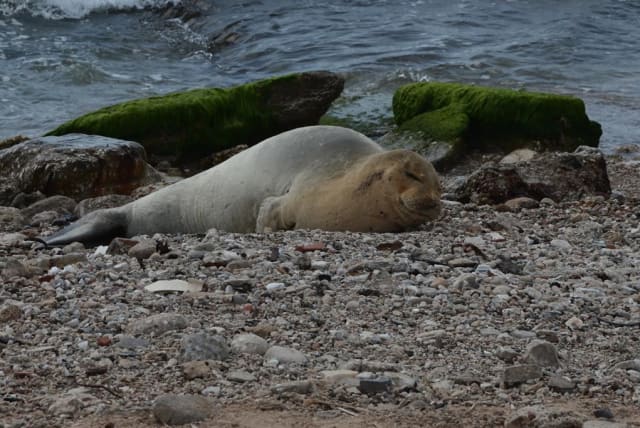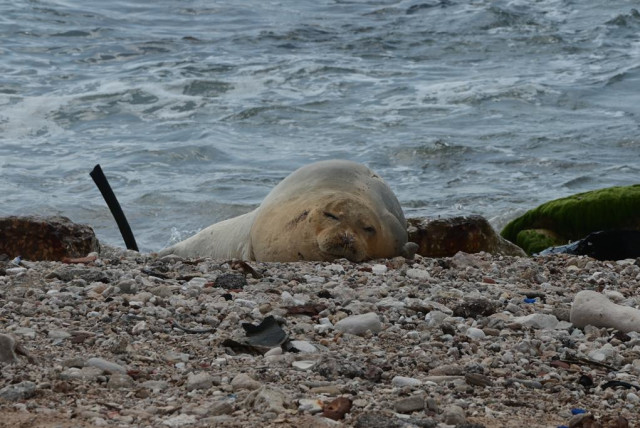Mediterranean monk seal spotted for first time on Israel's shores

The Mediterranean monk seal is considered a critically endangered species.
For the first time in recorded history, a Mediterranean monk seal was spotted on the shores of an Israeli beach.
On Friday, the female seal, believed to be between three and five years old, was discovered resting on a beach in the country's center, according to the Israel Nature and Parks Authority. Seals like this have been observed in the water, but this is the first time one has been found on the beach.
Mediterranean monk seals were declared critically endangered species a decade ago and are considered one of the 12 rarest mammals in the world. There are currently only around 700 – a small number for a mammal whose reproduction rate is only about one offspring every two or three years. As such, models have predicted their extinction chances at higher than 50% within three generations.
However, seal researcher Dr. Mia Elser of the Delphis Association, a nonprofit organization for marine mammals in Israel, said that in recent years there had been hundreds of sightings of the rare seal in the water, giving hope that these mammals may one day return to Israel.
Female named Yulia by boy on the beach
The female seal was named Yulia by a young boy, Muhammed, who was on the beach when the seal was discovered and helped the Delphis researchers prevent other children from bothering her while she rested there.
Nature and Parks Authority officials also stayed on the beach throughout the night to guard Yulia.
In 2010, nearly five decades after no seals had been sighted off the country’s coast, the first photographic evidence of a seal occurred. Since then, more than 90 sightings have been collected – from Ashkelon to Rosh Hanikra, the parks authority said. One sighting in May 2020 was of a very young seal. Elser noted that the researchers photographed Yulia to see if she could be that same seal or a different one.
She said although it did not seem that the seal was in distress, it is likely that Yulia was exhausted based on the fact that she did not move away, even when people gathered around her.
“It seems she traveled a long distance yesterday,” Elser said Saturday, noting that most of the monk seal population is located in the North, so it is likely Yulia swam from there.
About 400 of the 700 remaining monk seals are thought to live off the coasts of Greece, Cyprus and Turkey, hence the optimism that these rare mammals could one day return to Israel if the country prepares to receive them.
“If we want them to stay here, we must provide them with a place where they can rest undisturbed,” Elser said. “We must provide a home for the seals.”
Delphis is examining options for restoring caves in the Rosh Hanikra Marine Nature Reserve in collaboration with the Nature and Parks Authority, which could accommodate the seals.
Jerusalem Post Store
`; document.getElementById("linkPremium").innerHTML = cont; var divWithLink = document.getElementById("premium-link"); if (divWithLink !== null && divWithLink !== 'undefined') { divWithLink.style.border = "solid 1px #cb0f3e"; divWithLink.style.textAlign = "center"; divWithLink.style.marginBottom = "15px"; divWithLink.style.marginTop = "15px"; divWithLink.style.width = "100%"; divWithLink.style.backgroundColor = "#122952"; divWithLink.style.color = "#ffffff"; divWithLink.style.lineHeight = "1.5"; } } (function (v, i) { });

